Indiewire is reporting that Warner Independent has picked up Alan Ball‘s controversial Nothing is Private, which I favorably reviewed yesterday. That said, I’ve spoken to journo and industry folk who really hate it. When I told one of the haters (a woman) last night that I respected and admired it, she went “are you crazy?” She said she was greatly bothered by the young-girl sexual stuff. I replied that she’s probably more bothered by it than a typical 13 year-old girl would be.
wired
“I’m Not There”
Anyone who says Todd Haynes‘ I’m Not There (Weinstein Co., 11.21) isn’t an essential film to see — not just for the portions that “deliver” but the ones that are radiantly, eye-poppingly alive — is operating without the DNA of a true movie lover…it’s that simple. This is a great poetry-weave film, a reanimation of ’60s spiritual-cultural energy like no feature I can recall, and a magnificent head-tease that is always arresting, even during the fumble portions.

Cate Blanchett in I’m Not There
It’s not all-the-way fantastic (20% or 30% drags and meanders and sometimes confounds), but I’m saying for sure that you can’t not see it. You can blow it off when it opens theatrically and wait for the DVD, sure, but this will probably incur the suspicion of trusted friends and colleagues. Honestly, do you want that?
I knew Haynes had taken a huge bite going in with this ultra-ambitious patchwork exploration of Bob Dylan‘s life and legend (spanning from the late ’50s to late ’60s), in which he uses six different actors (Cate Blanchett, Christian Bale, Carl Franklin, Richard Gere, Heath Ledger and Ben Whishaw) along with numerous styles and palettes to convey various aspects of this unique life and legend.
What I didn’t anticipate was his impressive use of montage that ties together the various strands and makes a kind of harmony out of what could have been serious chaos. Nor did I expect the magnificent detail in each frame, the always-brisk pacing and the sheer “fun” aspect.
An example of the latter is a Dylan-frolics-with-the-Beatles-in-”64 moment that’s absolutely hilarious in a kind of of Jacques Tati-meets-Charlie Chaplin-meets A Hard Day’s Night sense.
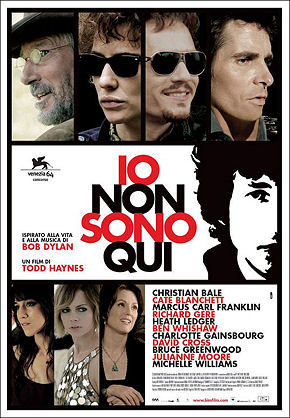
Did I mention this is Haynes’ absolute best film? That he’s pulled off one of the most exciting growth-surge displays of any directorial career, ever?
I’d heard from a friend at Telluride that I’m Not There is “an inside joke for Dylanologists” and okay, yeah, it is that…but for anyone open to full-crank cinematic stimulation it’s one of the most inventive and dazzling head-trip films I’ve ever seen. I went into it this afternoon with some trepidation, and then realized within minutes it would be much, much better than anticipated. It doesn’t really have much of a “thread” (by the classic definition of that term) and it loses tension from time to time, but when it’s “on” and rolling full steam it’s a wild-ass thing to behold.
On top of which it has to be seen for Blanchett’s knockout performance (captured entirely in black and white) as the Highway 61 Revisited/Blonde on Blonde Dylan. Forget Cate’s game performance in the catastrophic Elizabeth: The Golden Age and absolutely count on the fact that she’ll be nominated for Best Supporting Actress in the Haynes pic. Dylan fans are going to be blown away, but I can see others digging it as one of the best woman-playing-a man tour de forces ever put to film.
On one level her inhabiting of the ’65-to-’66 Dylan doesn’t feel entirely sincere — it’s a piece of performance art that feels a wee bit put-onny — but another level it’s psychologically “real” and shattering. For me Blanchett delivers as much of a knockout punch as Marion Cotillard‘s Edith Piaf does in La Vie en Rose or Jamie Foxx did in Ray, and perhaps even more so.
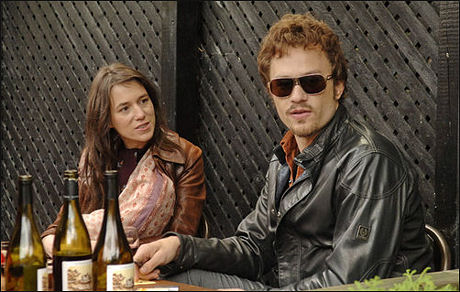
I’m speaking about much more than a physical capturing — the frizzy big hair, black shades, tight pants, Beatle boots and whatnot — or Blanchett’s spot-on imitation of his mumbly voice and guarded manner. I’m talking mainly about a convincing communion with that Dylan-esque otherness…that sense of odd, connected whimsy and all-knowing, tapped-in power that indicated all kinds of fascinating currents in the actual guy.
Yes, the Gere-in-the-country portion (a chapter evoking the reclusive John Wesley Harding/New Morning era) slows things down a bit, but even this section has its odd carnival-like charms. I’ll admit I was feeling a wee bit anxious and impatient, but Haynes saves it somewhat by cutting back to the Blanchett, Ledger, Bale and Whishaw portions now and then and thereby creating a welcome whatever-ness that at least staves off boredom.
Will those who’ve never listened to a Dylan album or seen Martin Scorsese‘s masterful No Direction Home be able to get into this film? Probably not, but the Dylan-deprived aren’t going to see it in the first place so the question is moot.
I felt alive and tingly as I walked down Bloor Street after seeing this film early this afternoon. I was saying to myself “this is what it feels like to feel charged up by a movie, by transcendent thought, by ravishing lyrics…by the whole magilla.”
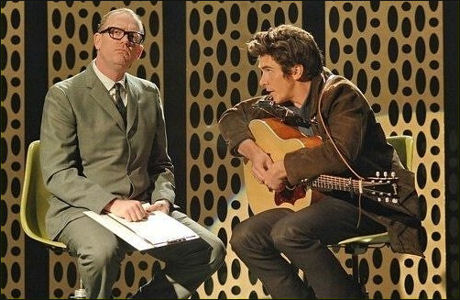
MPAA rationales
The ten lamest-sounding MPAA rationales for slapping this or that film with a PG-13 or an R or whatever, as compliled by the team at All Movie Guide.

Tuesday sked
Another full day today — Woody Allen‘s Cassandra’s Dream 25 minutes from now, something essential at 11:30 or thereabouts (can’t find my calendar), an interview with the director of Trumbo around 3 or 4, Brian DePalma‘s Redacted at 5:15 pm. Two parties last night — one at Casa Loma for In The Valley of Elah that began at 9 pm, and one that started two hours later for Atonement. Burning the wick at both ends will obviously get you sooner or later.
McCarthy trio at ROM

TIFF co-chief Piers Handling, Chaz (wife of Roger) Ebert and Man of Cinema: Pierre Rissient director (and top-dog Variety critic) Todd McCarthy prior to a late-morning screening of McCarthy’s doc at the Royal Ontario Museum.
Canadian guy quickies
A Canadian smarty-pants who reads a lot of scripts and with whom I’ve corresponded for three or four years says that (a) Vadim Perlman‘s In Bloom “is a mess…the only real value of the film is a strong Uma Thurman performance,” (b) that George Romero‘s Diary of the Dead “sucks,” (c) that The Girl in the Park is “a real bore,” and (d) that “acquisitions-wise this festival is dead…this could very well be the worst TIFF [in this respect] ever.”
Toronto quickies
I’m so far behind on my Toronto Film Festival opinions there’s no way I’ll catch up, so I’m going to just bang out a series of quickies. Tomorrow, I mean, as I don’t have any more time this evening. Okay, maybe a few quick draws. I saw Fugitive Pieces four days ago and ran a one-graph pan. I re-saw the finale of The Orphanage the same day and loved it all over again. I bailed on Amos Gitai‘s Disengagement after 40 minutes. Ang Lee‘s Lust, Caution isn’t a home run but a solid double — nothing wrong or seriously flawed about it — that deserves respect and patronage.
Control is flat-out awesome. Tony Gilroy‘s Michael Clayton is a nicely satisfying adult thriller — low-key, cleanly layered, “different.” No Country for Old Men will continue to be a brilliant landmark film for the foreseeable future. I’m still gung-ho for In The Valley Of Elah, and it’s good to know that other big guns are sharing that view. Rendition starts out well but devolves into a wank.
Juno is good — smart, spirited, cleerly written — but light-ish. Eastern Promises is, for me, second-rate Cronenberg with a cut-flesh-and-shar-knife fetish. Nick Broomfield‘s Battle for Haditha (which I saw this morning) is absorbing, bracing stuff, but the improvised dialogue feels a little too blunt and on-the-nose at times. Todd McCarthy‘s Man of Cinema: Pierre Rissient doc is a tribute to full-hearted passion of whatever kind, and a pleasure as far as it goes. And Neil Jordan‘s The Brave One is a far, far better film that Michael Winner‘s Death Wish, and an occasion for another first-rate Jodie Foster performance.
Spielberg’s Crystal Skull
Okay, so Steven Spielberg‘s long-awaited 4th Indy is going to be called Indiana Jones and the Kingdom of the Crystal Skull. My first two visual reactions (and they weren’t all that stirring) were (a) a crystal meth addict bouncing around his East Village apartment in 1969 after snorting two gigantic lines, and (b) Cpt. Jim Morrison leading a loyal crew across uncharted seas on the Crystal Ship. It’s forced and dopey-sounding at the very least. A movie about a skull made of crystal (crystal what?) that exudes such legendary power that a kind of kingdom has taken shape around or beneath it….get outta town.
Cates is back again
Gil Cates has been hired for his 14th stint as the Oscar telecast producer, and God help us all. Once again the been-around- forever cabal has reasserted and triumphed. The Academy Awards show will broadcast from the Kodak Theatre on 2.24.08.
Michael Mann’s Nike commercial
Michael Mann, football, Nike, CG…fantastic. And I’m not much of a football fan.
“Nothing Is Private”
I finally saw Alan Ball‘s Nothing Is Private this afternoon, and there’s no question about it being smart, thoughtful and high-grade. It’s not 100% flawless (I had two or three speed-bump issues) but it’s certainly a sturdy, complex character drama that’s 100% deserving of respect. It’s obviously one of the most original, daring films about adolescent sexuality ever delivered by a quasi-mainstreamer. It’s also a sharp look at racism (and not just the American-bred kind) and a sobering portrait of the rifts and tensions between American and Middle-Eastern mindsets.
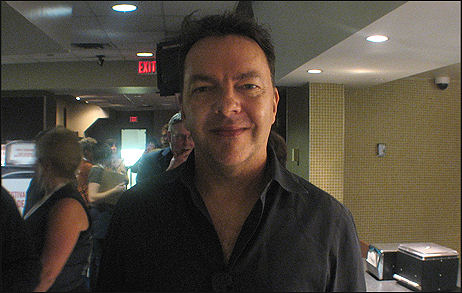
Nothing Is Private director-writer Alan Ball prior to today’s Cineplex Odeon public screening — 9.10.07, 1:40 pm
And all of this out of a fairly simple period drama, set in a Houston suburb around the time of the Gulf War, about a 13 year-old half-Lebanese, half-Irish girl named Jasira (Summer Bishil), and what happens as she gradually decides, under the fiercely oppressive watch of her Lebanese dad (Peter Macdissi), to explore/ indulge her budding sexuality with two older guys — a randy but nice-enough African-American high schooler in his mid teens (Eugene Jones) and a sleazy neighborhood dad in his early 40s (Aaron Eckhart).
It’s based on Alicia Erian‘s “Towelhead,” a respected novel that was published three or four years ago.
The word around the festival is that Nothing Is Private is a problem movie because of the sexual stuff, and the latter relationship in particular. (“It’s too shocking and disturbing to get a strong release…nobody serious will dare touch it,” one guy opined earlier today). But it’s not exploitation…not even a little bit. It’s a smartly written thing with all kinds of intrigues, balances and counterweights built into each character, and an earnest residue of humanity seeping through at the finish.
Even Eckhart’s character, scumbag that he is, has tics and shadings that make him more than just a thoughtless statutory rapist. Even Jasira’s dad, a dictatorial racist thug of the first order, comes off as somewhat sympathetic at times. And each one is his own way cares for Jasira. And despite the dark sexual currents (and as odd as this sound), it’s also a fairly amusing film. Really. It’s really boils down to being a “neighborhood folks and their quirks” movie that…okay, is a little bit icky in two or three scenes but isn’t nearly as icky in a general sense as you might expect.
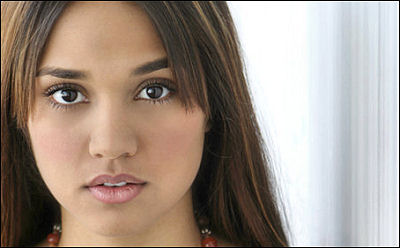
Summer Bushill in Alan Ball’s Nothing Is Private
Ball is careful not to fetishize Bushill’s Jasira character in any way, shape or form. She’s naked in a few scenes (doing the deed, getting pube-shaved, etc.) but next to nothing is “shown.” Bishil was 17 or 18 when the film was shot (she just turned 19 last July), and Ball has been very, very careful about not including anything that might be construed as even a faint turn-on.
Her acting throughout the film is somewhere between fine and quite good for the most part, but she also has scenes here and there that feel underplayed and awkward. Plus she looks tiny as hell — she seems about as tall as a typical eight year-old — and that’s obviously discomforting, given the context.
And I wasn’t that big on Newton Thomas Sigel‘s cinematography, which is all shadowy and burnished and amber-lit. It seems affected. Surburban Houston neighborhoods are dull, flatly-lit places (I’m sorry to say I’ve visited them), and I don’t see the point of trying to make the film look like the Vito Corleone sequences in Gordon Willis‘s The Godfather, Part II.
There’s no distributor on board (as far as I know), but why isn’t there at least a bare-bones Nothing Is Private website? And why can’t I find any photos?
But this is a film that definitely deserves a better rap than it’s been getting so far. It’s Alan Ball-ish every step of the way, and for me that means highly observant, well-acted, piercing, occasionally trippy and respectful of human beings. There are two TIFF press and industry showings happening tomorrow, so we’ll see what happens.
Penn to play Milk for Van Sant
“Conflicted excitement” sums up my reaction to Gregg Goldstein‘s Hollywood Reporter story about Sean Penn being favored by director Gus Van Sant to portray the late Harvey Milk, the openly gay San Francisco supervisor who was shot to death (along with SF mayor George Moscone) in ’78.
Penn will give the part hell, of course, but it feels like an odd call. He doesn’t look like Milk in the least (he’s at least a foot too short) and there’s something about Penn’s gruff Irish machismo vibe that doesn’t feel like a good fit. But it’s an intriguing prospect. Good acting is about transformation, and Penn has shown time and again he knows a thing or two about this.
Matt Damon is attached to play Dan White, the San Francisco supervisor who shot Milk and Moscone but was given a light manslaughter sentence (which outraged the city’s gay community, to put it mildly) and who later committed suicide. Damon seems exactly right for White (he gets working-class guys), although his participation in the Van Sant film is on the iffy side, according to Goldstein.
Michael London‘s Groundswell Prods. is financing the film, and Bruce Cohen and Dan Jinks are producing from a script by Dustin Lance Black. Goldstein is reporting that “the filmmakers are now in talks with a leading specialty division to launch the project,” and that once a deal is in place the untitled feature “hopes” to begin shooting in San Francisco as early as December.
The idea, in part, is to beat Bryan Singer‘s in-the-works Milk biopic, The Mayor of Castro Street, which producers Craig Zadan and Neil Meron will produce from a rewritten script by Chris McQuarrie. Warner Independent and Participant Productions will co-finance. I suggested a while back that Adrien Brody — a dead-ringer for Milk — would be a great casting choice on Singer’s part.
